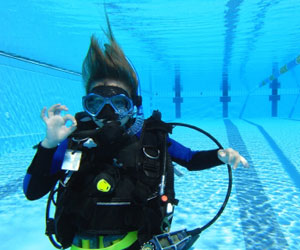Commercial Dive Schools
Does the ocean floor sound like a cool office? Do you like working with your hands and being active? Do you want to leave the suffocating 9 to 5 office job behind and try something new? If so, maybe you should look into a career as a commercial diver.
Commercial diving involves building, inspecting, and repairing things underwater. It is routine work done in an atypical environment. Plus, it pays well. The US Bureau of Labor statistics show that wages can range from $15 to $46 per hour. Some commercial divers even pull in 6-digit incomes!

Sounds pretty good, right? Unfortunately, you can’t just sign up to be a commercial diver. You need the necessary skills and certifications to be considered for these dive careers. The best way to get the proper training is to go to a commercial dive school. In the States, schools are located in Texas, New Jersey, California, Minnesota, Washington, Florida, and South Carolina.
Commercial dive schools train people to become commercial divers. Dive schools can be found all over the world, in a multitude of languages, and are usually located near the coast. When you are looking for a commercial diving school you need to assess several things – cost, length of course, location, curriculum content, international certifications, diving certifications earned, specialty training, job placement, reputation, safety, official organization membership, and your ability to fit in there.
To consider commercial dive school you must be 18 years old, have a high school diploma or the equivalent, pass a medical exam, and perform well in a pressure tolerance test (this is important because commercial divers dive deep!). Programs range from 16 weeks to 12 months or longer and cost anywhere from a few thousand dollars to nearly $20,000.
Research commercial dive schools and find what works for you. Some places offer room and board, others don’t. At some dive schools you’ll earn 2 certifications and others you’ll earn 10. You need to know what different schools offer. For instance if you wanted to work in the North Sea on an oil rig, you’ll want a school that has international certifications and an offshore focus.
It’s a good idea to look for a school that is associated with the Association of Commercial Diving Educators (ACDE) and the Association of Diving Contractors (ADC). These commercial dive organizations oversee different dive schools to ensure that they give their students high quality training and education that meets national standards.
You’ll want to look at the curriculum that each school offers. Do they cover physics, physiology, medicine, first aid, hyperbaric chambers, rigging, inland diving, offshore diving, welding, burning, HazMat, cutting, non-destructive testing, salvage, hydraulic tools, scuba, deep diving, penetration diving, oil operations, bridge inspections, hot water systems, mixed gas diving, remote operated vehicles, HAZWOPER, dive tending, decompression treatment and tables, underwater communications, surveying, dive accident management, industry regulations, marine environments, equipment troubleshooting, navigation, search and recovery, hull inspections, tether line diving, environmental surveys, dive rescue, low visibility diving, or any other number of skills that you want to have?
A dive schools curriculum is important and will have an impact on what you can do when you complete your training.
Many dive schools will also assist you in the job hunt after you complete your training. If you want to be a successful commercial diver, prepare yourself. Training can last for long hard hours in environmentally challenging settings. You’ll be in the classroom learning dive theory and underwater learning skills like welding and inspecting. Whatever happens, smile and learn your stuff.


 Teach English in Asia
Teach English in Asia  Cruise Ship Jobs
Cruise Ship Jobs  Alaska Fishing Industry Jobs
Alaska Fishing Industry Jobs  Sharing Economy / Gig Economy
Sharing Economy / Gig Economy